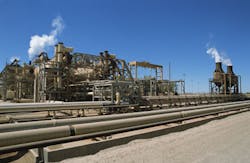Dow Chemical leaves industry group amid natural gas export row
The debate on whether the United States should provide part of its plentiful supplies of natural gas as exports to other countries has stirred the opinions of industry groups, manufacturers and traders in recent weeks.
Two widely trusted organizations in the industry, the National Association of Manufacturers (NAM) and the American Chemistry Council (ACC), have both expressed their support for export of natural gas, but their comments have sparked an immediate reaction from a number of major companies, which criticized their view. According to corporations like Dow Chemical and Celanese, such a stance on natural gas export is a risky one because it may challenge the organizations' trustworthiness among key chemicals and steel member companies. Exporting natural gas might lead to higher demand on the domestic market that could not be met, and ultimately to a rise in prices, they claimed.
In fact, Dow Chemical disagreed with the NAM's position to the extent that it officially announced its withdrawal from the association on Jan. 18. According to Dow Jones, Dow Chemical sent a letter to NAM President Jay Timmons accusing the association of taking sides, rather than adopting "a position of neutrality on an issue that clearly splits its membership." The move from Dow Chemical suggests that conflicting views over natural-gas exports have become extremely divisive for some of the largest U.S. companies.
Dow's chief executive Andrew Liveris said that unchecked exports would endanger investments in the U.S. manufacturing sector. Unlimited export of liquefied natural gas is likely to have a dramatic effect on manufacturing feedstock prices and their volatility, Liveris said. In its letter, Dow accused the NAM of putting the interests of oil and gas producers above those of its manufacturing members.
Although Dow Chemical spokeswoman Nancy Lamb refused to comment on the letter, she stated that the decision regarding the company's membership of the ACC will be discussed later. The ACC explained that Dow Chemical was a valued member of the organization but did not comment any further.
The idea of exporting U.S. natural gas has formed over the last few years as a direct result of the sudden boost in oil and gas production, following the advances in drilling techniques that unlocked new supplies previously thought to be uneconomical to produce. The Energy Department is currently looking into at least a dozen proposals for natural gas export to countries which lack a free-trade agreement with the United States, including key natural-gas consumers like Japan and countries in Western Europe. Last month, the department issued a report stating that exports would be beneficial to the U.S. economy.
Meanwhile, ExxonMobil, one of the companies that are planning to venture into natural gas export and another NAM member company, claimed that Dow Chemical was being "protectionist" and "opportunistic." ExxonMobil is planning to build a natural-gas export terminal in Texas.
